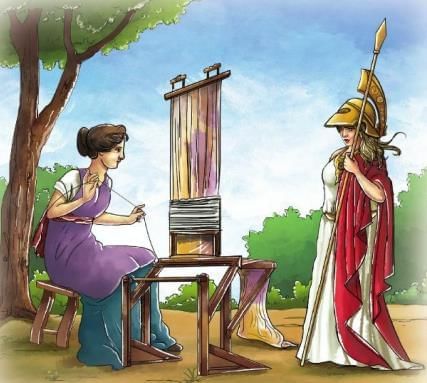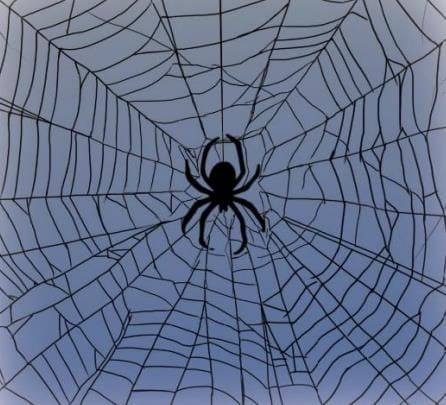The Wonderful Weaver Chapter Notes | English Class 3 ICSE PDF Download
| Table of contents |

|
| Introduction |

|
| Key Points |

|
| Explanation |

|
| Message |

|
Introduction
This story is from Greek mythology. It is about a girl named Arachne who was very good at weaving. She made beautiful, soft cloth from wool, silk, and flax. The story also talks about Athena, the goddess of wisdom and arts. Arachne’s skill led her to a weaving contest with Athena, and the ending is surprising. The story teaches us about talent, pride, and humility.

Key Points
This story is about:
- A young girl named Arachne who was very skilled at weaving and made beautiful cloth.
- Arachne working every day, spinning thread in the sunlight and weaving cloth in the shade.
- People from many places coming to admire Arachne’s wonderful weaving work.
- Arachne boasting that she taught herself to weave and didn’t need anyone’s help.
- Athena, the goddess of wisdom and arts, challenging Arachne to a weaving contest.
- Arachne creating a strong and colorful web, while Athena wove a magical and more impressive one.
- Arachne feeling sad because she could no longer weave after losing the contest.
- Athena turning Arachne into a spider so she could continue weaving webs forever.
Explanation
Arachne was a young girl from Greece who loved weaving. She spent her mornings spinning thread under the sun and her afternoons weaving cloth in the shade. Her cloth was so thin, soft, and bright that it seemed made of sunlight and gold, drawing people from all over the world to admire it.
When someone asked who taught her, Arachne proudly said she learned by herself while sitting in the sun and shade. This caught the attention of Athena, the goddess of wisdom and arts, who appeared and questioned if Arachne thought she could match her skills. Arachne boldly agreed to a contest, saying she could even teach Athena.

Three days later, they both prepared to weave. Arachne set up her loom under a mulberry tree, while Athena used the sky as her workspace. Arachne wove a light, strong web with colorful threads that amazed everyone, even making Zeus nod in approval. However, Athena wove a magical web using colors from the sun, clouds, fields, and woods, filled with pictures of flowers, castles, mountains, people, animals, giants, and dwarfs.
This enchanted everyone so much that they forgot Arachne’s work. Feeling defeated and sad, Arachne cried, worried about living without weaving. Seeing her sorrow, Athena felt sorry and wanted to help.
She explained that Arachne could never use a loom or spindle again but, because she loved weaving, turned her into a spider with a touch of her spear. The spider, now Arachne, happily spun and wove a web in the grass. She continues to live this way, and any spider you see might be her.

Message
The story teaches us to be thankful for our talents and not to be too proud. Just like Arachne, whose pride caused trouble, Athena’s kindness helped her keep weaving as a spider. It shows that humility and using our skills wisely can lead to a happy life.
New Words with Meanings
- Spin: To make thread from wool or other materials.
- Weave: To create cloth by crossing threads.
- Fine: Something of very good quality.
- Loom: A machine used to make cloth.
- Flax: A plant used to make thread.
- Rare: Something uncommon or hard to find.
- Yarn: Thread used for making cloth.
- Queen of the air: an expression to show that Athena is from heaven
- Goods: products; things
- Boast: To talk proudly about oneself.
- Grew pale: Became lighter in color due to fear or shock.
- Spindle: A piece of wood used for spinning wool into thread.
- Mulberry: A tree with broad leaves and juicy berries.
- Marvellous: Amazing.
- Meshes: The small gaps between the threads in a cloth.
- Mingled: Mixed together.
- Delight: Pleasure or joy.
- Maiden: A young girl or woman who is not married.
- Enchanting: Fascinating.
- Weeping: Crying.
- Pity: Feeling sorry for someone.
- Spear: A stick with a pointed blade at one end.
- Nimble: Quick and active.
- Merrily: In a happy way.
- Woods: Forest.
- Men: Humans.
- Beasts: Animals.
|
36 docs|18 tests
|
FAQs on The Wonderful Weaver Chapter Notes - English Class 3 ICSE
| 1. What is the main theme of "The Wonderful Weaver"? |  |
| 2. Who are the key characters in "The Wonderful Weaver"? |  |
| 3. How does the story of "The Wonderful Weaver" reflect cultural values? |  |
| 4. What lessons can be learned from "The Wonderful Weaver"? |  |
| 5. In what ways does "The Wonderful Weaver" inspire creativity in its readers? |  |














